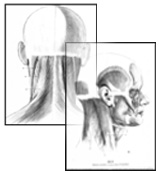
What does tinnitus sound like?
The sound is most often described, by people who are experiencing tinnitus, like ringing in the ears or head. But is also described in other ways; a squeaking sound, whizzing, high pitched frequency, sound of electricity from a TV or the refrigerator. Others describe the sounds more like a moaning or deep muffled sound.
The volume of the sounds can also be different from person to person. Some experience lower volumes while others might experience a really loud sound in their ears or head.
Irrespectively the cause can be the same: tension and stress.
This noise can interfere, in day-to-day life, on different levels for different people. Some might just experience mild noise, while others have such a loud noise that it can decrease the quality of life tremendously for the person.
As you experience tinnitus you might also be experiencing other symptoms, like headaches, pain in your neck or jaw.
Does tinnitus go away?
You can try certain methods to make your tinnitus lessen – and even go away completely.
If you got tinnitus – try to reflect on the state of mood you were in – about 6 months to 1 year before your tinnitus emerged. Did you experience some kind of emotional stress during that period? This could alert you to when the tension started. Insight and action will help your tinnitus go away.
How long does tinnitus last?
This depends on different factors. When it comes to somatic tinnitus – it will remain for as long as the muscle tension is present. The reason for this is because tinnitus is a symptom related to tension in the jaw, face, temples, and neck. Therefore it can only disappear once the tension is reduced.
It is up to you to do something about your situation and reaction if you wish for the tinnitus not to last.
The tension itself could be activated by tooth clenching and/or grinding. The behavior to clench or grind is most often triggered by emotional stress. The state of emotions for that stress might be either anger, frustration, irritation, impatience, anxiety, nervousness.
- Maybe you are a person that has a lot on your mind?
- Maybe you are an overachiever?
- Maybe you have a lot of anxiety in your life?
The state of alertness from these emotions keeps you tense. Getting a better understanding of how your body reacts to stressors, and how that affects your tinnitus, are the first steps to getting better. The next step would be to take action to lessen the stress.
Is tinnitus permanent?
There are treatment options, however, depending on your situation those treatment options will differ.
If you have had tinnitus for many years you may think that it is permanent. Perhaps your physician has told you that it is. This is not all true, but it is important that you come to insight regarding whether you experience emotions correlated to stress, and to do something about your situation.
Stop clenching and start to relax, take deep breaths, and stretch your muscles in the jaw, face and neck/shoulders. It might sound hard and you might think “this is easier said than done”. It is not something that is done overnight and it will take determination, but it is doable.
In some cases, you might need to see your dentist, where you can get an acrylic night guard that helps lessen the ability to grind your teeth during the night.
You are also welcome to purchase our “Help to Self-help” where you get to understand your symptoms better – your first steps to getting less tinnitus and even the possibility of having your tinnitus go away completely.
Our “Help to Selfhelp” is a comprehensive questionnaire with advice along the way that shows up depending on your answers, to fit your needs the best. The connection between muscle tension and stress problems, and in turn tinnitus, is very apparent and can be seen in our treatment result-graph.
If you want to dig deeper into this correlation you can read our scientific publications about this topic.



